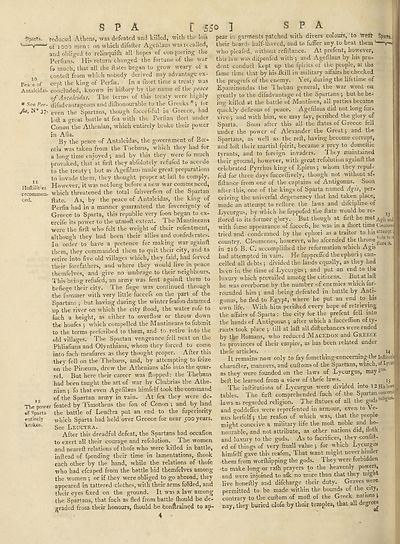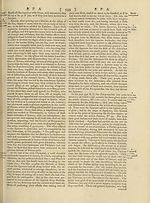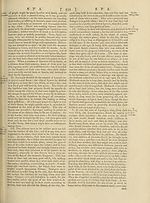Encyclopaedia Britannica, or, a Dictionary of arts, sciences, and miscellaneous literature : enlarged and improved. Illustrated with nearly six hundred engravings > Volume 19, Scripture-SUG
(598) Page 550 - SPA
Download files
Complete book:
Individual page:
Thumbnail gallery: Grid view | List view

SPA [ 550 ] SPA
-Sparta, reduced Athens, was defeated and killed, with the 1ms
t*"—y of 1000 men: on which difafter Ageiilaus was recalled,
and obliged to relinquilh all hopes of conquering the
Pertians. His return changed the fortune of the war
fa much, that all the ftates began to grow weary of a
contelt from which nobody derived any advantage ex-
Pea e of cept the king of Perfia. In a Ihort time a treaty was
Antalcklas. concluded, known in hiftory by the name of the peace
of Antalcidas. The terms of this treaty were highly
* See Per- difadvantageous and difhonourable to the Oieeks \ tor
N’ 37- even the Spartans, though fuceehful in Greece, had
loft a great battle at fea with the Perfian fleet under
ConorTthe Athenian, which entirely broke their power
in Afia.
By the peace of Antalcidas, the government ot Boe*
otia was taken from the Thebans, which they had for
a long time enjoyed •, and by this they were fo much
provoked, that at firft they abfolutely refufed to accede
to the treaty •, but as Agefilaus made great preparations
to invade them, they thought proper at lall to comply.
HoftiHt'es However, it was not long before a new war commenced,
recomrnen- which threatened the total fubverfion of the Spartan
ced. ftate. As, by the jieace of Antalcidas, the king of
Perfia had in a manner guaranteed the fovereignty of
Greece to Sparta, this republic very foon began to ex-
ercife its power to the utmoft extent. 1 he IVIantineans
were the firft who felt the weight of their refentment,
although they had been their allies and confederates.
In order to have a pretence for making war againft
them, they commanded them to quit their city, and to
retire into five old villages which, they laid, had ferved
their forefathers, and where they would live in peace
themfelves, and give no umbrage to their neighbours.
This being refufed, an army was fent againft them to
befiege their city. The fiege was continued through
the fummer with very little fuccefs on the part of the
Spartans ; but having during the winter fealon dammed
up the river on which the city ftood, the water rofe to
fuch a height, as either to overflow or throw down
the houfes 3 which compelled the Mantineans to fubmit
to the terms preferibed to them, and to retire into the
old villages. The Spartan vengeance fell next on the
Phliafians and Olynthians, whom they forced to come
into fuch meafures as they thought proper. After this
they fell on the Thebans, and, by attempting to feize
on the Pineum, drew the Athenians alfo into the quar¬
rel. But here their career was flopped: the Ihebans
had been taught the art of war by Chabrias the Athe¬
nian *, fo that even Agefilaus himfelf took the command
of the Spartan army in vain. At fea they were de-
TheVower feated by Timotheus the fon of Conon •, and by land
»f Sparta the battle of Leuftra put an end to the fuperiority
entirely whjch Sparta had held over Greece for near 500 years,
feroken. gee LeUCTRA.
After this dreadful defeat, the Spartans had occafion
to exert all their courage and refolution. I he women
and neareft relations of thofe who were killed in battle.,
inftead of fpending their time in lamentations, fhook
each other by the hand, while the relations of thofe
who had efcaped from the battle hid themfelves among
the women ; or if they were obliged to go abroad, they
appeared in tattered clothes, with their arms folded, and
their eyes fixed on the ground. It was a law among
the Spartans, that fuch as fled from battle ftiould be de¬
graded from their honours, fhould be bon&rained to ap-
4
pear in garments patched with divers colours, to Treat Sparta,
their beards half-ihaved, and to fuffer any to beat them
who pleafed, without refiftance. At prefent, however,
this law was dupenied with ; and Agefilaus by his pru¬
dent conduct kept up the Ipirits of the people, at the
fame time that by hisikill in military affairs he checked
the progrefs of the enemy. \ et, during the litetime of
Epaminondas the 1 heban general, the war went on
greatly to the diladvantage (if the Spartans \ but he be¬
ing killed at the battle of Mantinea, all parties becaftie
quickly delirous ot peace. Agefilaus did not long fur-
vive; and with him, we may fay, periihed the glory of
Sparta. Soon after this all the ffates of Greece fell
under the power of Alexander the Great; and the
Spartans, as well as the reft, having become corrupt,
and loft their martial fnirit, became a prey to domeftic
tyrants, and to foreign invaders. They maintained
their ground, however, with great refolution againft the
celebrated Pyrrhus king of Epirus j whom they repul-
fed for three days fuccefiively, though not without af-
fiftan.ee from one of the captains of Antigonus. Soon
after this, one of the kings of Sparta named per¬
ceiving the univerfal degeneracy that had taken place,
made an attempt to reftore the laws and difcipline of
Lycurgus, by which he fuppofed the ftate would be re-
ftored to its former glory. But though at firft he Aghand
with fome appearance of fuccefs, he was in a ihort time Cieomew
tried and condemned by the ephori as a traitor to Lis *
country. Cleomenes, however, who alcended the throne
in 216 B. C. accompliihtd the reformation which Agis
had attempted in vain. He fuppreffed the ephori; can¬
celled all debts ; divided the lands equally, as they had
been in the time of Lycurgus 5 and put an end to the
luxury which prevailed among the citizens. But at la ft
he was overborne by the number of enemies which fur-
rounded him j and being defeated in battle by Anti¬
gonus, he fled to Egypt, where he put an end to his
own life. With him perifhed every hope of retrieving
the affairs of Sparta: the city for the prefent fell into
the hands of Antigonus ; after which a fucceflion of ty¬
rants took place ^ till at laft all difturbances were ended
by the Romans, who reduced Macedon and Greece
to provinces of their empire, as has been related under
thefe articles. _ 14
It remains now only to fay fometbing-concemingthe Inftitutil
charaefer, manners, and cuftomsof the Spartans, which, ofLycurJ
as they were founded on the laws of Lycurgus, may s
bell be learned from a view of thefe laws.. _ 15 Q
The inftitutions of Lycurgus were divided into l2Hlslaws |
tables. The firft comprehended fueh of the. Spartan conrernii
laws as regarded religion. The ftatues of all the godsu ’S
and goddeffes were reprefented in armour, even to Ve¬
nus herfelf j the reafon of which was, that the people
might conceive a military life the moft noble and ho¬
nourable, and not attribute, as other nations did, floth
and luxury to the gods. As to facrifices, they confifl¬
ed of things of very ftnall value ; for which Lycurgus
himfelf gave this reafon, That want might never hinder
them from worftiipping the gods. 1 hey were forbidden
*to make long or rafh prayers to the heavenly powers,
and were injomed to afk no more than that they might
live honeftly and difeharge their duty. Graves were,
permitted to be made within the bounds of the city,
contrary to the cuftom of moft of the Greek nations \
nay, they buried clofe by their temples, that all degrees
-Sparta, reduced Athens, was defeated and killed, with the 1ms
t*"—y of 1000 men: on which difafter Ageiilaus was recalled,
and obliged to relinquilh all hopes of conquering the
Pertians. His return changed the fortune of the war
fa much, that all the ftates began to grow weary of a
contelt from which nobody derived any advantage ex-
Pea e of cept the king of Perfia. In a Ihort time a treaty was
Antalcklas. concluded, known in hiftory by the name of the peace
of Antalcidas. The terms of this treaty were highly
* See Per- difadvantageous and difhonourable to the Oieeks \ tor
N’ 37- even the Spartans, though fuceehful in Greece, had
loft a great battle at fea with the Perfian fleet under
ConorTthe Athenian, which entirely broke their power
in Afia.
By the peace of Antalcidas, the government ot Boe*
otia was taken from the Thebans, which they had for
a long time enjoyed •, and by this they were fo much
provoked, that at firft they abfolutely refufed to accede
to the treaty •, but as Agefilaus made great preparations
to invade them, they thought proper at lall to comply.
HoftiHt'es However, it was not long before a new war commenced,
recomrnen- which threatened the total fubverfion of the Spartan
ced. ftate. As, by the jieace of Antalcidas, the king of
Perfia had in a manner guaranteed the fovereignty of
Greece to Sparta, this republic very foon began to ex-
ercife its power to the utmoft extent. 1 he IVIantineans
were the firft who felt the weight of their refentment,
although they had been their allies and confederates.
In order to have a pretence for making war againft
them, they commanded them to quit their city, and to
retire into five old villages which, they laid, had ferved
their forefathers, and where they would live in peace
themfelves, and give no umbrage to their neighbours.
This being refufed, an army was fent againft them to
befiege their city. The fiege was continued through
the fummer with very little fuccefs on the part of the
Spartans ; but having during the winter fealon dammed
up the river on which the city ftood, the water rofe to
fuch a height, as either to overflow or throw down
the houfes 3 which compelled the Mantineans to fubmit
to the terms preferibed to them, and to retire into the
old villages. The Spartan vengeance fell next on the
Phliafians and Olynthians, whom they forced to come
into fuch meafures as they thought proper. After this
they fell on the Thebans, and, by attempting to feize
on the Pineum, drew the Athenians alfo into the quar¬
rel. But here their career was flopped: the Ihebans
had been taught the art of war by Chabrias the Athe¬
nian *, fo that even Agefilaus himfelf took the command
of the Spartan army in vain. At fea they were de-
TheVower feated by Timotheus the fon of Conon •, and by land
»f Sparta the battle of Leuftra put an end to the fuperiority
entirely whjch Sparta had held over Greece for near 500 years,
feroken. gee LeUCTRA.
After this dreadful defeat, the Spartans had occafion
to exert all their courage and refolution. I he women
and neareft relations of thofe who were killed in battle.,
inftead of fpending their time in lamentations, fhook
each other by the hand, while the relations of thofe
who had efcaped from the battle hid themfelves among
the women ; or if they were obliged to go abroad, they
appeared in tattered clothes, with their arms folded, and
their eyes fixed on the ground. It was a law among
the Spartans, that fuch as fled from battle ftiould be de¬
graded from their honours, fhould be bon&rained to ap-
4
pear in garments patched with divers colours, to Treat Sparta,
their beards half-ihaved, and to fuffer any to beat them
who pleafed, without refiftance. At prefent, however,
this law was dupenied with ; and Agefilaus by his pru¬
dent conduct kept up the Ipirits of the people, at the
fame time that by hisikill in military affairs he checked
the progrefs of the enemy. \ et, during the litetime of
Epaminondas the 1 heban general, the war went on
greatly to the diladvantage (if the Spartans \ but he be¬
ing killed at the battle of Mantinea, all parties becaftie
quickly delirous ot peace. Agefilaus did not long fur-
vive; and with him, we may fay, periihed the glory of
Sparta. Soon after this all the ffates of Greece fell
under the power of Alexander the Great; and the
Spartans, as well as the reft, having become corrupt,
and loft their martial fnirit, became a prey to domeftic
tyrants, and to foreign invaders. They maintained
their ground, however, with great refolution againft the
celebrated Pyrrhus king of Epirus j whom they repul-
fed for three days fuccefiively, though not without af-
fiftan.ee from one of the captains of Antigonus. Soon
after this, one of the kings of Sparta named per¬
ceiving the univerfal degeneracy that had taken place,
made an attempt to reftore the laws and difcipline of
Lycurgus, by which he fuppofed the ftate would be re-
ftored to its former glory. But though at firft he Aghand
with fome appearance of fuccefs, he was in a ihort time Cieomew
tried and condemned by the ephori as a traitor to Lis *
country. Cleomenes, however, who alcended the throne
in 216 B. C. accompliihtd the reformation which Agis
had attempted in vain. He fuppreffed the ephori; can¬
celled all debts ; divided the lands equally, as they had
been in the time of Lycurgus 5 and put an end to the
luxury which prevailed among the citizens. But at la ft
he was overborne by the number of enemies which fur-
rounded him j and being defeated in battle by Anti¬
gonus, he fled to Egypt, where he put an end to his
own life. With him perifhed every hope of retrieving
the affairs of Sparta: the city for the prefent fell into
the hands of Antigonus ; after which a fucceflion of ty¬
rants took place ^ till at laft all difturbances were ended
by the Romans, who reduced Macedon and Greece
to provinces of their empire, as has been related under
thefe articles. _ 14
It remains now only to fay fometbing-concemingthe Inftitutil
charaefer, manners, and cuftomsof the Spartans, which, ofLycurJ
as they were founded on the laws of Lycurgus, may s
bell be learned from a view of thefe laws.. _ 15 Q
The inftitutions of Lycurgus were divided into l2Hlslaws |
tables. The firft comprehended fueh of the. Spartan conrernii
laws as regarded religion. The ftatues of all the godsu ’S
and goddeffes were reprefented in armour, even to Ve¬
nus herfelf j the reafon of which was, that the people
might conceive a military life the moft noble and ho¬
nourable, and not attribute, as other nations did, floth
and luxury to the gods. As to facrifices, they confifl¬
ed of things of very ftnall value ; for which Lycurgus
himfelf gave this reafon, That want might never hinder
them from worftiipping the gods. 1 hey were forbidden
*to make long or rafh prayers to the heavenly powers,
and were injomed to afk no more than that they might
live honeftly and difeharge their duty. Graves were,
permitted to be made within the bounds of the city,
contrary to the cuftom of moft of the Greek nations \
nay, they buried clofe by their temples, that all degrees
Set display mode to:
![]() Universal Viewer |
Universal Viewer | ![]() Mirador |
Large image | Transcription
Mirador |
Large image | Transcription
Images and transcriptions on this page, including medium image downloads, may be used under the Creative Commons Attribution 4.0 International Licence unless otherwise stated. ![]()
| Permanent URL | https://digital.nls.uk/192703056 |
|---|
| Attribution and copyright: |
|
|---|
| Description | Ten editions of 'Encyclopaedia Britannica', issued from 1768-1903, in 231 volumes. Originally issued in 100 weekly parts (3 volumes) between 1768 and 1771 by publishers: Colin Macfarquhar and Andrew Bell (Edinburgh); editor: William Smellie: engraver: Andrew Bell. Expanded editions in the 19th century featured more volumes and contributions from leading experts in their fields. Managed and published in Edinburgh up to the 9th edition (25 volumes, from 1875-1889); the 10th edition (1902-1903) re-issued the 9th edition, with 11 supplementary volumes. |
|---|---|
| Additional NLS resources: |
|

